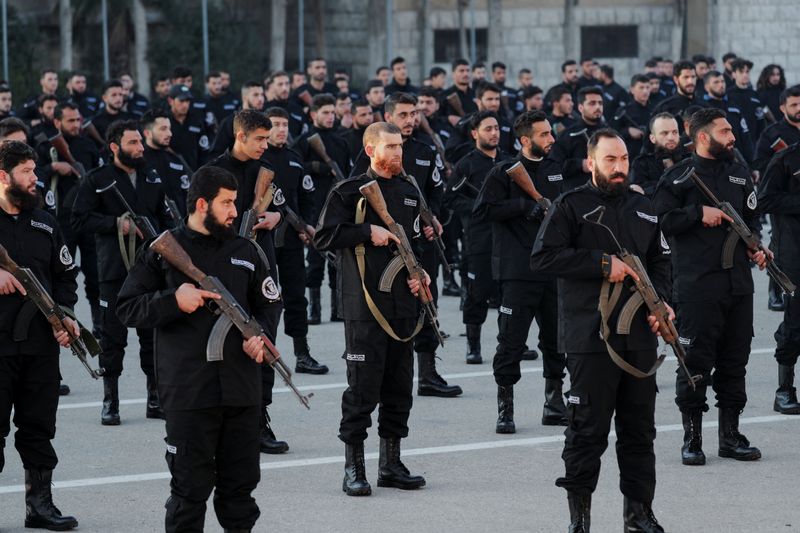Syria’s new leaders turn to Islamic law in effort to rebuild Assad’s police By Reuters

Written by Amina Ismail and Khalil Ashawi
DAMASCUS (Reuters) – New Syrian authorities are using Islamic teachings to train a fledgling police force in a move officers say is aimed at instilling a sense of morality as it races to fill a security vacuum after dismantling the government of ousted President Bashar al-Assad, notorious for its corruption and brutality. Security forces.
Five senior officers and application forms seen by Reuters say police brought to Damascus from their former opposition-controlled enclave in the northwestern Idlib region ask applicants about their beliefs and focus on Islamic law in the short training they give recruits.
Ensuring stability and gaining the trust of people across Syria will be crucial for Sunni Muslim Islamists to consolidate their rule. But regional analysts warn that the move to put religion at the center of policing threatens to sow new divisions in a diverse country rife with weapons after 13 years of civil war and resenting foreign governments trying to attract it.
“There are a lot of Syrians who will find this troubling,” said Aaron Lund, a fellow at Century International, a think tank focused on the Middle East, when asked about the Reuters findings. “Not just minorities — Christians, Alawites, Druze — but also a lot of Sunni Muslims in places like Damascus and Aleppo, where there is a fairly large secular and cosmopolitan population that is not interested in religious law.”
A diplomat who was not authorized to speak publicly about the matter said that the religious foundations of police training make Western governments wonder how big a role Islam might play in the Syrian constitution, which the former opposition faction now in power is planning to review. .
“It’s not a good sign, but it also depends on how strictly it is implemented,” the diplomat told Reuters.
Syria’s de facto leader, Ahmed al-Sharaa, sought to reassure Western officials and Middle Eastern governments concerned about Islamist movements in their countries that his faction had abandoned its previous ties to al-Qaeda and would rule with moderation, including protecting minorities.
Hay’at Tahrir al-Sham has a track record of pragmatism, having backed away from implementing some strict interpretations of Islamic law in areas it controlled during the war.
The Syrian Ministry of Interior, which oversees the police, and the Ministry of Information did not respond to questions about the emphasis on religion in police recruitment and training, or whether there are plans to incorporate Islamic law into the legal system.
Senior police officers interviewed by Reuters said the aim was not to impose this on the general population but to teach recruits moral behaviour.
Understanding religious matters, “what is permissible and what is not permissible,” is crucial for recruits to “act justly,” said Hamza Abu Abdel Rahman, who helped establish the group’s police academy in Idlib before moving to Damascus.
The police were disbanded
Assad’s countless security forces were widely feared for their authoritarian and predatory behavior, from arresting dissidents who ended up being tortured or killed to demanding bribes to resolve minor infractions.
The extent of popular anger against them was clear in the days following the ouster of Assad on December 8. Most police stations in the capital were ransacked by thieves and equipment and records were stolen or destroyed.
Police said that about half of the 20 stations have since reopened, but each is staffed by about 10 officers, most of whom were brought in from Idlib, instead of the previous number of between 100 and 150 officers.
At three stations visited by Reuters in late December, a group of exhausted officers were trying to deal with a wide range of cases, from complaints about rampant crime to a garbage collector who brought in two bags of grenades found in the street.
When the rebels seized power, they announced the dissolution of Assad’s Interior Ministry and security forces, including the police.
Hisham Hilal, who leads courses for recruits at the Police Academy in Damascus, said that more than 200,000 people have registered their names to join the new police force that they are creating.
Senior officers told Reuters that police who defected to the opposition side before Assad’s fall are welcome to apply to join the new force.
Those who were not asked to do so were required to complete a “reconciliation” process, including signing a document accepting regime change and surrendering their weapons. It is not yet clear whether any of them will be allowed to join the new force.
Seven officers who run police stations or are involved in recruitment said they needed more members and welcomed applications from people of any faith.
But the focus on Sharia law was a deterrent for some.
A 45-year-old Christian, who used to work in the Assad Traffic Police, said he would not apply to join the new force even if he could. Speaking on condition of anonymity for safety reasons, he said he was concerned that even people in humble roles like himself would be seen as part of the Assad regime, and that the focus on Islamic law meant there would be discrimination against followers of other faiths.
Hundreds of residents participated in a demonstration in the capital, Damascus, in December, demanding secular rule and equal rights for women.
“No one is against Islam, but we are certainly against religious rule based on specific texts and hadiths” — sayings and actions attributed to the Islamic prophet Muhammad — said one participant, Ali Al-Aqbani, when asked about the use of Sharia law in policing.
Al-Aqabani, 50, is a Muslim, but he said that Damascus is “diverse in its sects and sects.”
Meanwhile, the new Syrian authorities need to train police quickly, because Assad’s forces have “completely evaporated, and stability is a very key issue,” Century International’s Lund said. “Following what they know and have always done may be the easiest way to do it.”
In Idlib, which HTS has controlled since 2017, the group initially conducted patrols to impose hardline Islamist views on public behavior, said Aaron Zelin, a senior fellow at the Washington Institute for Near East Policy.
A UN commission of inquiry said in a 2021 report that women were detained for traveling without a male family member or for immodest clothing.
But ethics patrols were later scaled back because residents didn’t like them, Zelin said.
Al-Sharaa, the leader of Hay’at Tahrir al-Sham, has spoken out against the tough approach to public behavior, but the coalition he leads includes members considered more extreme, adding to minority concerns.
New power
The scale of the crisis facing the new force was starkly evident in the police stations visited by Reuters in December.
In the Damascus Police Directorate, and in the Marjeh and Kafr Sousa stations, rooms were filled with papers, broken glass, abandoned uniforms, ammunition, and broken furniture. Officers cleared some rooms for work, but computers and phones were stolen.
Outside Marja and Kafr Sousa, there were green and white police cars, with broken windows and flat tires.
In the Damascus District, the new police chief, Basil Faouri, and the head of operations, Abu Ahmed Al-Sukkar, said that they had slept little since their arrival from Idlib.
Sugar had a mattress propped up against a closet because he slept at his desk. At least 20 people entered with requests, problems or complaints during the two hours that Reuters was available.
A businessman wanted to agree to hire a private security company to protect his restaurants and shopping malls from thieves. Others wanted permission to organize neighborhood protection groups. The police said they welcomed this for the time being but would not allow such groups to carry weapons.
All senior officers interviewed by Reuters said they expected staffing levels to improve and more stations to reopen as recruitment and training expand this year.
On January 14, the Damascus Academy celebrated the graduation of about 500 police cadets who paraded in front of their trainers in new black uniforms. When Reuters visited the academy in December, dozens of men lined up at the academy gates to be interviewed by the force.
One of them, Zakaria Al-Hajji (19 years old), from the city of Deir ez-Zor in the east of the country, said that he did not like Assad’s rule, but he liked what he had seen so far from the new authorities. He said his cousins, who already worked for Hay’at Tahrir al-Sham, told him that the police would offer them good salaries.
The application forms seen by Reuters contain a section on “beliefs, orientations and opinions” where recruits are asked to present their “religious authority,” an expression commonly used to refer to Muslim religious leaders who are considered by different sects to be religious authorities.
Although religion has long been listed on identity documents in Syria, under Assad it was not customary to specify a school of thought.
Three Hay’at Tahrir al-Sham officials, who spoke on condition of anonymity because they were not authorized to speak to the media, said the question was intended to help identify applicants who would need more careful vetting, especially Alawites, who belong to the same sect as Assad and may have ties to With the lion. His system.
Hamida Antara Al-Matar, who was interviewing police defectors who wanted their old jobs back at the Damascus Academy, said this was “just a routine question” and was not intended to discriminate against any faith or sect, including Alawites.
Instructors and recent graduates told Reuters that new recruits receive only ten days of training, most of which is in handling weapons and Islamic law.
Ahmed Latouf, who headed the police academy in the former rebel enclave before being appointed police chief in Aleppo, said that when the security situation improves, the goal is to increase training to nine months, using a system introduced by the rebels in Idlib.
Lattouf said by phone from Aleppo that the religious education provided to recruits includes the principles of Islamic jurisprudence, the biography of the Prophet Muhammad, and rules of conduct.

The head of the Marjeh police station in Damascus, Ayman Abu Talib, said he was concerned that many Syrians would view Hay’at Tahrir al-Sham as extremist and would not accept their rule. But he said he did not understand why their reliance on Islam would be a concern.
He added: “The religion that respects human rights more than others is Islam.”
(Reporting by Amina Ismail and Khalil Ashawi in Damascus; Additional reporting by Maya Gebaili in Beirut and Angus McDowell in London; Writing by Angus McDowell; Editing by Alexandra Zafis)
https://i-invdn-com.investing.com/news/news_headline_open_108x81._800x533_L_1419519630.jpg
2025-01-23 10:09:00





